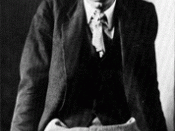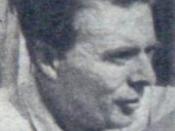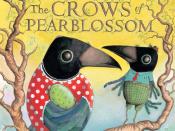Aldous Huxley's Brave New World and George Orwell's 1984 Even now, George Orwell's 1984 and Aldous Huxley's Brave New World continue to sell in great numbers. Orwell has coined such words as "Big Brother,"� "Newspeak,"� and "doublethink,"� which are even known by some people who haven't read his novel. Aldous Huxley and Brave New World have gained much attention through his skill of making the science fiction seem believable as an extension of twentieth-century society. Although both books take place in the future, it is not correct to label either novel as a prediction of what is to come. Both novels can be thought of as a means of warning the present society about certain tendencies that may become realities in the future. Orwell does not mean to give a projection of what life would be like in the year 1984; the title is only a reversal of digits from when the book was published in 1948.
His purpose in writing the novel is to ensure that the kind of society portrayed in 1984 will never happen. The novel should be thought of as a satire whose purpose is not to predict the future, but to warn the present. Like Huxley, Orwell saw a threat to the existence of the individual and true thought to be in the power of the highly centralized government. Both books are thus a distopia. They are a variation on Utopian literature in which society is not represented as an ideal, but as a miserable world that highlights the worst of the present society. The Utopian type of literature takes its name from Sir Thomas More's Utopia (1515-16), a novel which depicts a perfect society in which all its citizens live together in happiness and content. Characteristics of the genre distopia in George Orwell's 1984 and Aldous Huxley's Brave New World is perceived through the loss of individuality as a result of sociological advances and the use of irony to reveal satire.
Characteristics of the genre distopia in George Orwell's 1984 and Aldous Huxley's Brave New World is perceived through the loss of individuality as a result of sociological advances. Loss of individuality as a result of sociological advances in Brave New World can be explained through the World State's motto: "Community, Identity, Stability."� The motto emphasizes the importance of the group and the indifference of the individual (Baker 135). The first part of the slogan, "Community,"� stresses the significance attached to the individual as a contributor to society. People of the World State can be compared to the cells that make up a mammal (Watts 219). The individual cells are not as important as the animal as a whole. If an individual should die, the society of the World State will not be affected, which is demonstrated in Bernard's conversation with Lenina. While both are in a helicopter, Bernard states that being in the presence of nature makes him more "himself,"� and "Not just a cell in the social body"� (90). Lenina is of course confused by this statement because she can't comprehend what it feels like to be an individual. Citizens are taught this way of associating themselves with society through many hours of sleep-teaching, or hypnopaedia, which is evident in the World State's motto "Everyone belongs to everybody else"� (47).
The second part of the slogan that demonstrates loss of individuality as a result of sociological advances in Brave New World is "Identity."� This is not at all referring to individual identity, but rather to the various classes and their particular duties (Magill 2:309). Before they are even born, each person of the State is predestined an identity whose duties will help the well-being of society. No one has a choice of anything in their life, the World State controls every aspect of the individual. Conditioning before birth prepares the child for the kind of job he/she will do as an adult. This also makes the person accept their job, no matter how difficult or unbearable it is (Nance 68). Their gestation time is even accelerated if they are going to be of a lower caste, because their positions don't require any intelligence. The rigid caste system and specialized duties predestined to an individual before birth further demonstrates the loss of individuality of the Citizens of the World State.
The last slogan that demonstrates loss of individuality as a result of sociological advances in Brave New World is "Stability,"� which is the most important of them all. To the World State, the most important function of society is stability ( Baker 137). The best way to preserve stability is through Bokanovsky's Process, in which a single ova buds and divides into as many as 96 identical babies. When a student asks what the advantages of such a process might be, the Director of Hatcheries and Conditioning replies, "Bokanovsky's Process is one of the major instruments of social stability"� (7). Each embryo is predestined to a specific intelligence, depending on their future caste. When the identical babies grow into their respected roles in society, they will share the same thoughts and actions. They will therefore have no desire to overcome one another or aspire anything from society (Baker 137). They are just a product of their society with no individual thoughts or actions. This characterization of individuals provides for a very stable society, which is exactly what the World State sets out to do.
Loss of individuality as a result of sociological advances in 1984 can be explained through the principles of Newspeak. The first way Orwell uses Newspeak to demonstrate loss of individuality is by limiting the meaning of words and thoughts (Reilly 133). The Eleventh Newspeak Dictionary has narrowed all possible concepts to one meaning, which makes the word's definition very rigid and impossible to have shades of meaning or different connotations. This limits the range of thought so that by the year 2050 when the dictionary is finally released, any thoughts that would let a person think for themselves would be almost impossible. Unlike other languages, Newspeak is the only language whose amount of words is decreasing. All words that contradict the Party or let people think like an individual are eliminated. As Syme, an editor of the Eleventh Newspeak Dictionary says, "It's a beautiful thing, the destruction of words"� (154). Thus, citizens are not able to express their views, only the party's. Loss of individuality is complete when words cease to have meaning and thoughts are limited to those of the Party (Reilly 88).
The second way Newspeak demonstrates loss of individuality as a result of sociological advances in 1984 is to confuse rather than clarify. Newspeak is not only a way of communication, but a social and political tool to fool people (Reilly89). Its goal is to deliberately twist language so thoughts not approved by the Party are impossible (Bloom 88). This is best demonstrated in the B vocabulary of Newspeak, which consists of words for political purposes only. These are compound words which alter the meaning of words so they are in conformity with the Party. The word "goodthink"�, for example, means "to think in an orthodox manner"� (Reilly 86). This implies that the only way to "think good"� is to think in conformity with the Party, and all other ways of thinking are "bad thinking"�. The only way people can think is through "goodthink"�, which makes their thought limited to that of the Party. Loss of individuality occurs because people are no longer individuals with their own opinions, but merely people who think like that of the Party.
Characteristics of the genre distopia in George Orwell's 1984 and Aldous Huxley's Brave New World is perceived through the use of irony to reveal satire. The use of irony to reveal satire in Brave New World is best illustrated by the contrasts of what is called the "civilized"� and "savaged"� individual in Brave New World. On the Reservation where John lives, no one has been conditioned. They've been left untouched to grow in an isolated society that resembles life before the World State came to power. Citizens still feel freedom and have high moral standards. According to Watts, this way of life is sharply contrasted when John is introduced to the "civilized"� values of the World State (283). Here, citizens have been conditioned and predestined to a specific kind of life and values that is the total opposite of the lifestyle on the Reservation. Huxley uses this contrast of human beliefs and values to satirize the ideas of the World State (Firchow 24). The irony he uses is what's considered the "civilized"� and "savage"� person. People of the World State are considered the civilized people, but have no freedom or moral standards. The people of the Reservation are considered the outcast from society, but have total freedom and concepts of right and wrong. Linda, who was raised and conditioned in the World State but later sent to the Reservation because of a disgraceful pregnancy, received beatings from the native women on the Reservation when she had sexual relations with their husbands. It is beyond Linda why these women would be upset. She still carries the values taught to her through the conditioning in the World State before she came to the Reservation. The values in the Reservation are considered unacceptable when compared to those of the World State. Thus, Huxley uses the irony of the values and beliefs of the "civilized"� and "savage"� person to further satirize the ideas of the World State that cause its distopia.
The use of irony to reveal satire in 1984 can be explained through the purpose of the Ministry of Love. The irony of this is its name. The Ministry of Love does not actually deal with love as its name would suggest. Its real function is the exact opposite: hatred and torture. As an example of satire, Winston never experiences "love"� in the Ministry (Flynn 56). It is a twisted love in which Winston is forced to love the Party and Big Brother. O'Brain uses torture and brainwashing to change Winston into the perfect citizen of the Party. As Howe says, "He [Winston] comes to love that which destroys him"� ( 80). Orwell also uses the irony of the Ministry's name as a symbol of the satiric treatment which the party treats its people. Citizens are not only taught that they love Big Brother, but that Big Brother loves them. Though the Ministry of Love deals with hatred, the Party transforms this hatred into a place of "love"� that the party gives to even its worst prisoners of Thoughtcrime, thus showing the Party's "love"� for their people (Hammond 289). Everyone that enters the Ministry of Love always loves Big Brother and knows that Big Brother loves them by the time they leave or are killed. O'Brain and the Party have watched over Winston for seven years, which is a sign that Big Brother "loves"� him (Bloom 15). The fact that the Ministry of Love makes people think that the Partly loves them is satiric of the real nature of the Ministry, which is based on hate, the opposite of love.
Characteristics of the genre distopia in George Orwell's 1984 and Aldous Huxley's Brave New World is perceived through the loss of individuality as a result of sociological advances and the use of irony to reveal satire. The loss of individuality as a result of sociological advances in Brave New World can be explained through the World State's motto: "Community, Identity, Stablity."� The motto emphasizes the importance of the group and the indifference of the individual. "Community"� suggests the significance of the individual as a contributor to society. "Identity"� refers to the specific roles predestined to each member of the World State for the well-being of society. The last part of the motto, "Stability,"� involves the most important function of society: stability. Each person is conditioned so they will provide a very stable individual for society. The loss of individuality as a result of sociological advances in 1984 is best explained through the principles of Newspeak. Orwell's first use of Newspeak as a means of loss of individuality is limiting the meaning of words and thoughts. If people are not able to express their views and opinions, only the opinion of the Party, then the loss of individuality is complete. The second way Newspeak demonstrates loss of individuality is to confuse rather than clarify. Newspeak is not only a way of communication, but a social tool to twist language so only thoughts approved by the Party are possible. The use of irony to reveal satire in Brave New World is best illustrated by the contrasts of what is called the "civilized"� and "savaged"� individual. The irony of the values and beliefs of a "civilized"� person compared to a "savaged"� person reveals the satire of the ideas of the World State. The use of irony to reveal satire in 1984 can be explained through the purpose of the Ministry of Love. The irony of its name is there's never any love in the Ministry, only hatred and torture, which is contrary to what the name suggests. Satire is revealed through the irony of the Ministry's name because Winston only experiences a distorted love that forces him to love the Party and Big Brother. Orwell also uses the irony of the Ministry's name as a symbol of the satiric treatment which the party treats its people. Everyone is not only forced to love Big Brother, but to realize that Big Brother loves them. Both Brave New World and 1984 contain elements of loss of individuality through sociological advances and satire revealed through irony.
Works Cited Baker, Robert S. Brave New World. Boston: Twayne Publishers, 1990.
Bloom, Harold, ed. George Orwell's 1984. New York: Chelsea House Publishers, 1986.
Firchow, Peter Edgerly. The End of Utopia. London and Toronto: Associated University Presses, 1984.
Flynn, Nigel. George Orwell. Vero Beach: The Rourke Corporation, Inc., 1990.
Hammond, J.R. A George Orwell Companion. London: The Macmillan Press LTD, 1982.
Howe, Irving. 1984 Revisited. New York: Harper & Row Publishers, 1983.
Magill, Frank N. "Brave New World."� Masterplots. 2 vols. Englewood Cliffs: Salem Press, 1976.
Nance, Guinevera A. Aldous Huxley. New York: Continuum, 1988.
Reilly, Patrick. Ninteen Eighty-Four. Boston: Twayne Publishers, 1989.
Watts, Harold H. Aldous Huxley. Boston: Twayne Publishers, 1969.



